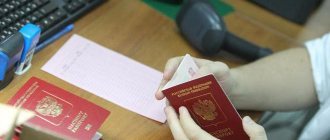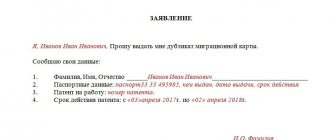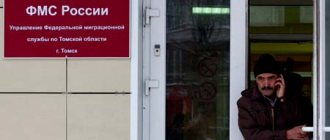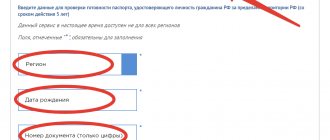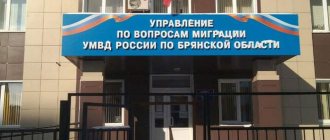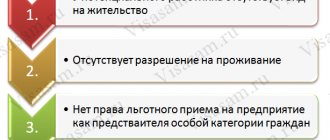Russian language teacher Tatyana tries to attract the attention of students from her Roma class on Zoom. Valera's smartphone is running low, and someone is persistently trying to fight with a girl named Oisha with a pillow. Tatyana does not give up and shows enviable persistence. Her sonorous voice and bright toy do their job: this time the guys are still working on the topic of prepositions.
These first graders have no idea how lucky they are to be in this lesson.
According to statistics, 25% of children from migrant families do not go to school at all.
Considering that 15 million migrants were registered in Russia in 2021, the number of illiterate and unsocialized children runs into the thousands.
The invisible problem
According to Anna, an expert on the migrant adaptation program “Equally Different,” Moscow migrant children are forced to stay at home if they do not have registration. Capital schools do not accept them due to the Order of the Ministry of Education No. 32 of 2014.
Anna considers this practice illegal. The right to education is guaranteed by international conventions, federal laws and the Constitution, and the controversial order was even clarified by the Supreme Court :
“It says that it is being interpreted incorrectly: registration is not required for admission to schools.”
Anna explains the unlawful actions of school administrations as simple fear and ignorance: “One woman said that she was ready to accept everyone, but was afraid that she would be fired because of this. Dismissal of directors is a fairly common practice.” To restore justice, our interlocutor often communicates directly with directors and explains to them how to properly process an unregistered migrant child.
Anna sees the obvious interest of the authorities in threats against directors and illegal registration records:
“We regularly hear that the position of the Department of Education and its head personally regarding migrant children is fundamentally very tough. It’s as if they don’t exist in Moscow, which means the problem doesn’t need to be solved. If they appear from somewhere without registration, they are instantly included in the deadly category of illegal.”
Migration expert Konstantin, in his report for the organization “Civic Assistance,” says that the Ministry of Internal Affairs is no less interested in what is happening. By collecting personal data of students, department employees implement migration control within schools.
According to Konstantin, city officials perceive education not as a fundamental right, but as a service. In their minds, an undocumented migrant does not pay taxes, so his children cannot count on education.
At the same time, officials do not realize that registration is a long and complicated process. Most often, neither the employer nor the landlord assists the migrant in this matter. A person is forced to turn to semi-legal companies, which often scam him out of large sums.
Teaching migrant children at school
Migrant children have the right to get engaged in a Russian school. This is stated in the above-mentioned Article 78 of the Federal Law “On Education”. This article states that foreign children have the right to attend kindergartens, schools, and also receive vocational education in Russia. According to the law, there should be no difference between the enrollment of a child from a migrant family and a Russian child in school.
Any foreign parents can apply to admit their child to school. Regardless of whether they live in Russia under a temporary residence permit or residence permit, or work under a patent or without a patent under an employment contract. The main thing is that both the child and the parents are in Russia legally.
You can register a foreign child to study at school through:
- MFC;
- Public services;
- For residents of Moscow - through the website mos.ru. To get into a school in the capital, a child will definitely need registration or migration registration in Moscow.
The rules by which a child is admitted to an educational institution are stated in the Procedure for the admission of citizens to study in educational programs of primary general, basic general and secondary general education (the document was approved by order of the Ministry of Education and Science of the Russian Federation dated January 22, 2014 No. 32).
To admit a foreign student to a Russian educational institution, the following documents are required:
- The parent needs to prepare an application - it is worth considering that, in addition to the basic information about the last name, first name, patronymic, date of birth, you will also need to copy information from the birth certificate and registration document.
- The parent will need to present their passport.
- The child's birth certificate will be required. The document will need to be shown in original.
- Registration or migration registration in the territory to which the school is assigned.
- A document confirming relationship with the student.
- You will also need a document that confirms that the parent and child are in Russia legally (for example, a migration card, temporary residence permit, residence permit)
- For admission to grades 10 and 11, a certificate for grade 9 must be presented.
The document does not say, but schools also usually require you to provide a medical insurance policy for the child.
Certificates written in a foreign language must be translated. The translation is certified by a notary.
According to clause 5 of Order No. 32 of the Ministry of Education and Science of the Russian Federation, only the lack of free places at school can become a reason for refusing to admit a child.
- Migrants in Russia
Rights of foreign citizens in Russia: about treatment, training and communication with the police
- Elena Voropaeva
- 26.06.2020
As for the education of migrant children who are transferred from a foreign school to a Russian one, the child is enrolled in the class that corresponds to the level of education received by the minor in a foreign country. In this case, the materials of the child’s personal file and the grades he received at his previous school are taken into account.
In some cases, the school may organize a mid-term assessment, during which it will be decided which grade the child should be enrolled in.
Subscribe to Migranta Rus: Yandex News.
Why teach other people's children?
Even if migrants do not have any problems with paperwork, there will always be opponents to their education. Anna believes that they are not convinced by humanistic messages in the spirit of “migrants should be allowed to access social services, if only because these services are made by people for people.”
She invites adherents of this point of view to look at the problem more pragmatically. The childhood of a migrant child without a school is harmful not only for him, but also for the entire society: “The child is left without the main environment where he is socialized. He will either sit at home without education and friends, or he will go out into the streets.” Such “street” socialization often leads to crime. Such a person does not have the skills and opportunities for integration; his environment does not contribute to his development. At some point, he is simply forced to resort to illegal methods of survival.
Anna adds that widespread training for migrants would significantly improve not only the social situation, but also the economic situation:
“If a person gets an education, he can work in the white sector and provide transparent benefits in the form of taxes.”
This will affect the development of the economy much better than if a person does not have any social elevators and everyone around him believes that by definition he can only work for a small fee and without a contract.
Adaptation Program for Migrant Children
Any adaptation program for migrant children must simultaneously solve a number of problems and be built taking into account the individual characteristics of each child. It should help not only get used to the new country, but also contribute to the formation of the child’s personality. The main objectives of the program can be formulated as follows:
- involve migrant children in the educational activities of the school;
- help children integrate into a new team and establish relationships with peers;
- develop the child’s creative abilities;
- introduce to the cultural diversity of the social environment.
To do this, the program must be comprehensive, including educational, social and sociocultural adaptation.
Educational adaptation of migrant children
For every migrant child, school becomes the main institution of adaptation, because that is where he spends most of his time. Teachers and school management have a great responsibility, because it is on them that it largely depends on how quickly the child gets used to the new environment.
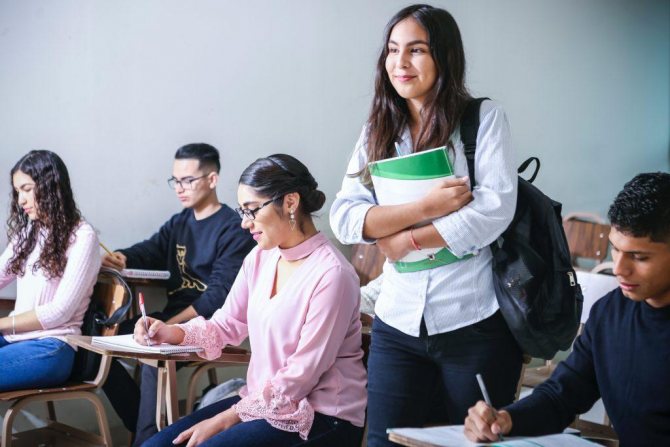
Knowledge of the language is the main problem of a child at school. Photo: unsplash.com Author: javier trueba
The main problem when studying at school is knowledge of the Russian language. The later a child arrives in the country, the more difficult it is for him to learn the language. Therefore, teachers should be understanding that a foreign child may need a little more time to master new material.
In turn, children should be prepared for the fact that they will have to additionally study some subjects that their classmates already know. For example, to fill gaps in knowledge of Russian literature and Russian history. To a greater extent, this applies to high school students.
In Moscow, according to the Center for Migration Research, only 75% of migrant children go to school and receive an education. Many of them are 1-2 years behind their peers because their knowledge does not meet the school requirements.
Social adaptation of migrant children
Additional stress for a child who has moved to another country is caused by the fact that he leaves his friends and loses contact with them. Therefore, in order to quickly get used to a new place, it is important for a child to find new friends.
The emergence of friendship is facilitated by common hobbies, especially sports games, because in sports even a language barrier will not be an obstacle. It was also noticed that children are brought together by common problems. Therefore, friendship often arises between migrant children, even if they came to Russia from different countries.
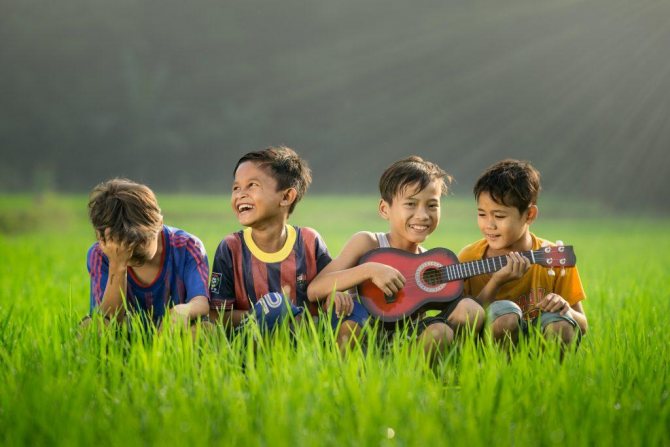
Common hobbies are the key to strong friendship. Photo: unsplash.com
All schools periodically conduct surveys to identify problems in relationships in the classroom. It was found that on average 80% of the migrant children surveyed did not encounter negative attitudes from classmates and quickly joined the new team.
Sociocultural adaptation of migrant children
Each country has its own culture and traditions. We absorb them from childhood and carry them with us throughout our lives. Sometimes the traditions of several countries can conflict, which is why when moving it is very important to know the cultural characteristics of the new country.
Basic cultural norms and everyday features of Russia are taught to a foreign child, of course, by parents. And he receives more in-depth knowledge at school during lessons and extracurricular activities.
Some schools in the country offer special lessons for migrant children. In such classes, children role-play various everyday situations: going to visit a doctor, going for a walk on the street. Children are taught in a playful way communication norms, which, depending on the country, have their own specifics.
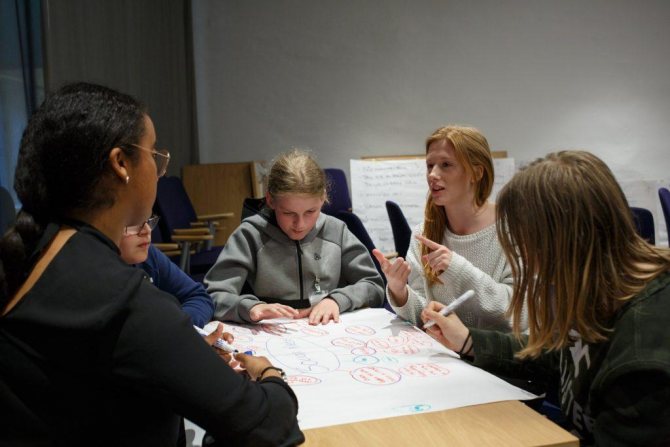
Additional activities for migrant children. Photo: unsplash.com. Author: Edvin Johansson
The adaptation of each migrant child will take place individually; it is impossible to develop a single adaptation plan for everyone. But at the same time, there are general recommendations, adherence to which will save time and help avoid injuring the child. The most important thing is to choose a comprehensive adaptation program and pay as much attention to the child as possible.
Video: Example of a game for adaptation of migrant children
Subscribe to Migranta Rus: Yandex News.
Unwanted child
Unconditional admission to school is only the first step in the right direction. Educating a migrant child becomes a greater challenge. The school often fails to cope with it: such a student is sent to the back of the class in younger classes, and they try to ignore his low results.
The fact is that Russian-speaking schoolchildren come to first grade already prepared, while children of migrants may never even hear Russian speech. For example, like the students of Maria (the heroine’s name has been changed), a class teacher from the Kaluga region: “They don’t know how to read, write, they have a very narrow outlook. They only know what they saw on TV - most often in programs for adults.”
If in St. Petersburg and Moscow the problem of poor training and ignorance of the language is partially dealt with by integration centers (for example, the “Same Children” project), then in the regions this task falls entirely on the shoulders of teachers like Maria.
Irina is the head of the “Equally Different” project and a former school literature teacher in the Kaluga region. She explains that subject teachers in such a situation do not understand who is responsible for teaching difficult children:
“If you teach geography, and your child doesn’t speak, you won’t teach him Russian. So this student goes to class and doesn’t understand anything, and every subject teacher is angry because the overall score in the class is falling.”
Anna believes that such lack of initiative is a sign of workload and lack of knowledge to help: “Nobody taught them to study Russian as a foreign language. They don’t have time to read a bunch of materials.”
Non-Russians on the honor board
Dima (the hero's name has been changed) is a graduate of one of the international Moscow schools. He talks about the parallel mixed classes as follows: “They had a greater emphasis on studying the Russian language rather than other subjects. They wasted time on spelling, but didn’t even learn any complex rules.”
Because of the basic curriculum, Russian-speaking children in these classes moved much more slowly. Dima even often joked with friends about the low level of education at his school. Now our interlocutor does not see anything wrong with mixed classes, but he would not send his children there: “The level of education is a priority.”
Dima’s opinion reflects the statistics: none of the 100 teachers surveyed in Tatarstan would like migrant children to study in their class, because because of them, overall academic performance drops sharply.
But separate education is not a solution; it is a harmful and unrealizable alternative. According to Irina, “adaptation is a two-way process. It is necessary for locals to learn to live with visitors, and for visitors to begin to navigate the culture.”
Anna is confident that migrant children, with the right approach and the presence of trained teachers, require no more effort than difficult Russian-speaking teenagers. Often they are even more motivated and persistent:
“When I come to a school near Moscow and look at the honor board, the names are mostly Tajik and Uzbek.”
How can a migrant enroll a child in school in Russia?
Many migrants coming to Russia to work also take their children with them, including those of school age. In this case, parents are faced with the question: how to properly enroll their child in school in Russia.
The most important rule is that your children must be on the territory of Russia legally, that is, have registration (a notice of migration registration, as well as a migration card. When entering the Russian Federation, the purpose of arrival for children must be indicated as “private.”
If everything is in order with the documents, then you can start enrolling your children in school. The most important thing you need to know is that children of foreign citizens of school age who are in Russia are not only able, but also obligated to go to school and receive an education. That is, the legislation in Russia implies and in every possible way promotes that your child is placed in an educational institution.
You need to place your child in school at the place of temporary residence (registration) of the parents. That is, first of all, you need to contact the school at your place of residence. They can refuse to enroll your child in school only because there are no places in the classes. Therefore, it is advisable to take care of this issue in advance, since enrollment in school occurs several months before the start of the school year. Enrollment in schools for the next academic year usually occurs in February-April for the first grade and in April-May for all other grades.
If there are no places available at your local school, you will need to be sent to another nearby school that has places available. They cannot refuse to enroll a migrant’s child in school. If you encounter difficulties in enrolling your child in school, you can contact the inspectorate of the education committee in your region or the RONO (district education department).
In order for your child to be enrolled in school, you need the following documents:
— child’s birth certificate, a copy of the birth certificate; — notarized translation of the birth certificate into Russian; — child’s migration card; — notification of the child’s registration for migration at the place of residence of his parents (registration); — passport of one of the parents, a copy of the passport; — migration card of one of the parents, a copy of the migration card; — notification of migration registration (registration) of one of the parents, copy of registration.
The following may also be useful: - medical insurance for the child; — vaccination certificate – issued in special medical institutions; - a medical report confirming that the child has undergone a medical examination and has no dangerous diseases - this can be obtained in special medical institutions; - a child’s medical card - created and filled out during a medical examination, or brought from the country of origin; - the student’s personal file - if the child previously studied at a Russian school.
You will also need to write an application for admission of your child to school in Russian on behalf of one of the parents. There you will need to indicate your last name, first name and patronymic, date of birth, as well as the citizenship of the child and details of his parents.
Before enrollment, a child may be sent for testing, where his readiness for school, knowledge of the Russian language, as well as the level of knowledge for enrollment in the appropriate class will be determined.
If you still have questions, you can always write to our lawyer, directly on the M Bulak website. Legal consultation is absolutely free!
Xenophobia in the school cafeteria
According to statistics from VTsIOM, almost a third of Russian parents try to limit the friendship of their child or grandchild with the children of migrants. Irina explains this attitude with an ordinary fear of the “other”: “Migrants live in diasporas, and our population is less consolidated. It seems like there are more others, they are threatening us with something, they will kick us out, take our jobs.”
Most often, such fear is expressed in stereotypes and everyday xenophobia. In schools, migrant children first encounter bullying, most often from teachers or administration.
Anna explains this by saying that xenophobia is typical for adults, and not for schoolchildren: “For young children, it doesn’t matter at all what someone looks like or what they say. They are curious about everything."
Mary’s disciples once faced such a traumatic experience. After duty, the girls returned to the classroom in tears because the barmaid said that “they didn’t clean well and that their whole gypsy classroom was dirty.” Maria talked to the woman. She blushed and explained her dissatisfaction this way: “They always buy pies, their hands are greasy, then all the benches are oily.”
After this conversation, the bullying stopped, and Maria’s class began wiping down the notorious oil benches during duty. Our interlocutor is convinced that it is important not only to pay attention to such incidents, but also to warn migrant children about stereotypes:
“How could it be different if this is true? Someday they will be treated badly, someday they will be called names. They won’t understand why this happened, and this anger will accumulate in them.”
Countess Andreevna
Dima, while studying at an international school, was able to comprehend stereotypes about the behavior of migrants based on personal experience. He witnessed unpleasant incidents: “In lessons, migrants were more angry with teachers. There were repeated altercations near the school. It happened that they fought wall to wall.” Dima always assessed such manifestations as properties of the individual, and not of the nation as a whole. He believes that during his studies he managed to maintain objectivity:
“I don’t have a template: “You’re not Russian - you’re aggressive - I’ll stay away from you.” Now at work I have colleagues from Tajikistan and Kyrgyzstan - all the guys are adequate, we don’t argue with anyone.”
On the other hand, it is difficult to deny the real distinctive features of migrants. Sanda, a teacher of English and RFL (Russian as a foreign language), says that she has heard of several long-standing cases where teachers do not want to teach migrants because they have a different discipline and routine. For example, sometimes such children bring their gender stereotypes to school: a brother and sister come, and a girl carries a heavy briefcase to a boy because she is a woman. Or the headmistress calls the parents to school, and they agree to speak only with the man.
Anna believes that these are isolated cases: “Not all men with migration experience treat women as unequal.” She suggests resolving such controversial issues in the format of dialogue: correctly explaining that in this society there are certain rules and frameworks. Anna is convinced that cultural differences have not yet led to insoluble conflicts in schools: “People who think otherwise are most often incited or have read the media, but have not dealt with it themselves.”
Teachers are indeed more likely to speak positively about the characteristics of migrants. For example, Maria admires how parents value their children: “In my class there are students named Countess Andreevna, Tsar, Almaza.” Maria believes that we should even learn from migrants about family and friendship:
“I would be the happiest child if my parents went to all my performances. Migrant parents will always look at their children, clap and support them.”
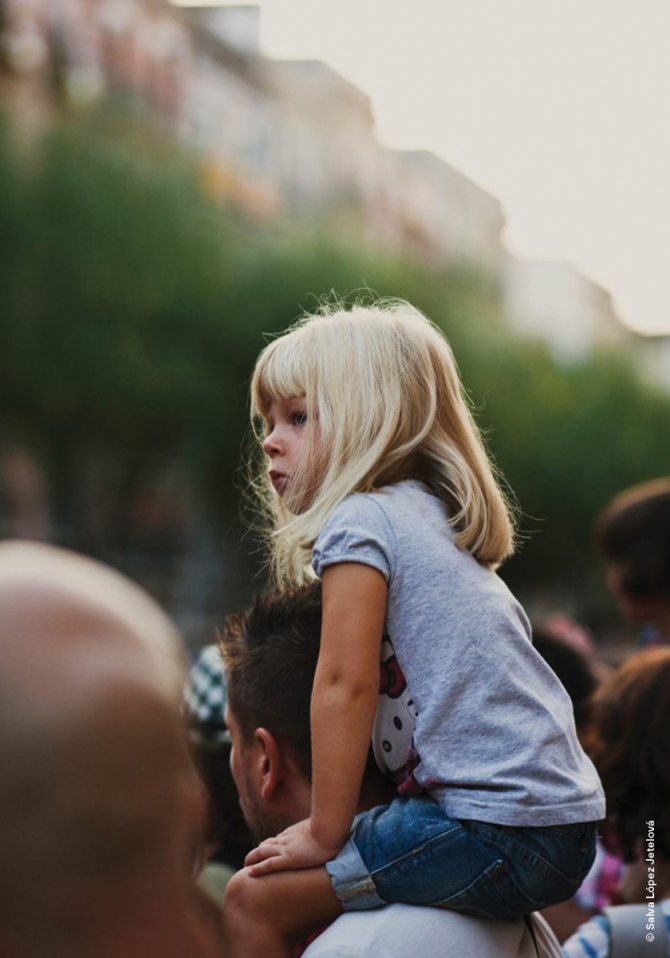
Russian-Tajik cosmonaut
Three years ago, Idibek and his father left the Tajik outback for the Kaluga region. He recalls: “My parents decided to move for a better education. I wasn’t sad, I was interested - dad said that this is the largest country.”
At first, Idibek faced obvious difficulties: “They didn’t take me to school because I didn’t know the language, I didn’t have documents, I was sitting at home. I tried to learn Russian, but I didn’t succeed.”
Six months later, Idibek’s life improved noticeably: he entered the fifth grade, he had real friends and a favorite literature teacher, Irina. At a group from the “Equally Different” program, he learned to speak Russian without an accent and even gave a presentation at a Moscow conference.
Idibek plans to study in Russia and get a serious profession:
“I want to become a lawyer because my uncle worked in court.”
But his real dream is to return back to Tajikistan: “Because I was born there. This is my native land."
Najimidin, the father of Matluba and Muhammad, shared his parental view of the move. Two years ago, he and his children left Tajikistan to reunite with their parents in the Kaluga region. Nadzhimidin says that the move was not easy for the children at first; they were bored. But they assimilated quite quickly: “I am a former officer, I previously studied in Kazakhstan. They were in a Russian environment there, so they already knew the language.”
When entering school, a controversial issue familiar to many migrants arose: teachers suggested keeping the children in the same class for a year in order to consolidate their knowledge. Nadzhimidin refused, and the boys were taken to fourth grade. As a result, Matluba and Muhammad did not disappoint their father and took their studies seriously: “There is some success, they are trying to be excellent students.”
Nadzhimidin has already obtained citizenship for them and plans to stay in Russia with them. He is proud of the children and supports their dreams for the future:
Do migrants have a direct route to Russian universities?
Add source to
Only we realized that migrants are not the best helpers in solving the demographic problem, when the Ministry of Education and Science intended, with the help of migrants, to solve the mythical, in our opinion, problem of the lack of demand for government-funded places in universities due to the falling birth rate.
| The Minister of Education the day before that university quotas for migrants from the CIS countries would increase many times over. In contrast to the total number of budget places in universities, which will decrease by 10% this year. |
The head of the educational department has long been famous for his
| Photo: Nakanune.ru |
the ability to generate, to put it mildly, ideas that are not useful for national education.
The decision to expand access to universities for foreigners, coupled with a reduction in government-funded places, in practice means only one thing: many Russians seeking higher education will simply not get places. Andrei Fursenko announced another innovation during a meeting of the ministers of education of the G8 countries. “We will increase the number of places and, moreover, we will simplify the procedure for admitting children from neighboring countries,” said the Russian minister .
However, innovation is a strong word. Quotas for migrants from CIS countries for budget places in Russian universities have been increasing annually over the past six to seven years. In 1999, according to scientists from the Center for Social Forecasting, 28.5 thousand citizens of the former USSR studied in Russia; in 2000, their number increased to 32 thousand, in 2001 - to 34.5 thousand.
| Two years ago, quotas were increased 2.5 times. More than 1.5 thousand migrants from neighboring countries have entered Russian universities and academies. This year, according to preliminary data, Russia will allocate about 6 thousand budget places. |
AND . O . Olga Chugunova , head of the department of cooperation with CIS countries , in a conversation with Nakanune.RU , did not give the exact figure, but confirmed that quotas have been significantly increased. The Federal Agency for Education is confident that there will be no shortage of people wishing to receive a Russian education.
| Photo: www.phys.nsu.ru |
But not all universities accept former compatriots for state-funded places.
Every year, Rosobrazovaniya compiles a list that mainly includes prestigious Moscow and St. Petersburg alma maters. For example, graduates of Latvian schools this year were offered places at the Moscow State University of Civil Engineering, Moscow State Technical University, Kant Russian State University in Kaliningrad and several universities in St. Petersburg. In total, Latvia received 50 budget places. As noted by the chairman of the Russian Society in Latvia, Tatyana Favorskaya , such a large quota has been allocated for the first time. And for the first time, Latvians will be able to study at creative and medical faculties.
At the St. Petersburg State University of Economics and Finance, which traditionally allocates quotas
| Photo: www.phys.nsu.ru |
for foreigners, Nakanune.RU reported that half of the foreign students studying at the university are citizens of the CIS. This is about 200 people. “Quotas increase annually by 15-20%. The Russian Educational Institution says that the university must accept so many foreigners for such and such specialties,” explained Vice-Rector for International Relations of St. Petersburg State University of Economics and Economics Igor Maksimtsev .
There are no Ural universities on the Rosobrazovaniye list. However, many Kazakhs study at universities in the Chelyabinsk region, which is primarily explained by the territorial proximity of Kazakhstan and the existence of agreements between the Ural region and the Republic.
| If you believe the research of scientists, Kazakhs make up the largest group of students from the CIS countries in Russia. In 2001, 16.7 thousand citizens of Kazakhstan studied at Russian universities. Ukrainians are in second place in number. Belarusians are a little behind them. |
However, more than half of foreign students come from foreign countries. First of all, Africa and Asia. Representatives of European countries, the USA, Canada, Latin America, Australia and New Zealand in 2001 made up just over 10% of the total number of students who came to Russia (data from the Russian Statistical Yearbook).
Another interesting fact. Year after year, the share of Chinese universities in domestic universities is growing
| Photo: www.day.kiev.ua |
students.
In general, China is one of the top five countries that actively send their citizens to study abroad. In 2000, more than 100 thousand Chinese boys and girls received knowledge at foreign universities. There are now 15 thousand Chinese studying in Russia - even more than in the 50s of the last century, when relations between the two countries were almost ideal. A most remarkable fact. But let's return to post-Soviet land. Quantitative dynamics can be easily observed using the example of Tajikistan. In 2001, about 0.4 thousand Tajik students received higher education in Russia. Now, as reported to Nakanune.RU at the Embassy of Tajikistan in Russia, 3 thousand Tajiks are learning the basics of science in the classrooms of Russian universities, 70% of them
| Photo: www.strani.ru |
arrived thanks to quotas. “As part of the agreement between Russia and Tajikistan, every year a huge number of students come to study in Russia. It is still unknown how many quotas have been allocated this year. The Russian Ministry of Education is now preparing documents,” said embassy press secretary Egamzod Muhammad Mashrafovich .
As for subject preferences, they too have changed. If previously Tajiks were mainly in demand for technical specialties, now they prefer to pore over legal sciences, foreign languages, journalism, and international affairs. In 2002, according to the Ministry of Education and Science, the majority of foreign students chose the engineering profession. Now they all want to study economics.
The Embassy of Tajikistan even welcomes these changes. As Egamzod Muhammad Mashrafovich noted, the country’s economy is in great need of competent economists.
| However, a reasonable question arises: why should Russia prepare them at its own expense? After all, their education is paid for by the Russian budget, and they receive the same stipend as their classmates from Russia. Africans and Chinese, by the way, mostly pay for education. |
Let's say we are talking about creating a so-called single
| Photo: psj.nsu.ru |
educational space, as officials from the Ministry of Education and Science have been persistently talking about for a long time.
Its creation provides citizens of the CIS countries with access to educational institutions on an equal basis with the indigenous population. However, it is easy to assume that universities in Tajikistan or Uzbekistan are not so attractive to Russian school graduates. Perhaps there is some political background. The training of students from the CIS countries is beneficial to Russia in light of the gradual Americanization of the post-Soviet space. However, in order to influence the situation outside Russia in this way, even the 6 thousand places allocated this year for migrants will not be enough. And it is not a fact that, having learned, they will be able to break into power in their homeland and make government decisions that Russia needs. Although theoretically it is possible to achieve a certain influence.
But we must also take into account the fact that not all foreigners, after studying at a university, return to their homeland. Many remain to live and work in Russia.
| There is no doubt - the more educated people around, the better. However, the level of knowledge of migrants often leaves much to be desired. The fact is that foreign applicants take exams for Russian universities in their home countries and it is almost impossible to test their real knowledge at the entrance. |
Let us turn again to the research of scientists. They note that the highest levels of basic education in 1994 and 2001 were citizens of Western European countries, the USA, Canada, Japan, as well as Latin American and Arab students. Africans and residents of the Central Asian republics of the CIS were the worst prepared. Some of them didn't even graduate from high school!
Deputy Chairman of the State Duma Committee on Education and Science Valentina Ivanova expressed concern that by increasing quotas for migrants from the countries of the former USSR, Russia will receive worthless but certified foreign specialists for its own money.
| But one could still come to terms with the low level of training of migrants and unjustified budget expenditures if the Ministry of Education and Science did not reduce budget places for Russian students. You understand what happens: quotas for migrants are increased, and for Russians they are reduced. |
In Soviet times, higher education massively trained personnel for
| Photo: psj.nsu.ru |
other countries.
Almost 90% of international students were from Asia, Africa and Latin America. But higher education in those days was free and accessible, first of all, to Soviet people. And budget-funded places in universities were not reduced, as they are now - by 10% annually. This year, Education Minister Andrei Fursenko promised to reduce their number by 43 thousand. Only 530 thousand people will be able to receive higher education for free. The Ural State Mining University has already faced layoffs. USGU Vice-Rector for Academic Affairs Sergei Frolov told Nakanune.RU that of the 40 positions cut, five are in economics, and the rest are in geology, technology, and mining - the most specialized areas.
| But this is not the limit. In the next few years, officials are going to bring the reduction of budget places to 25-30% and, thus, bring them into line with established standards. |
Today, the number of students studying at the expense of the budget is 209 people per 10 thousand population, with the legal norm of 170 people. And using the freed up funds, the quotas for migrants can be increased.
Officials motivate their decision by the demographic situation. In their opinion, schoolchildren graduating from school in
| Photo: Nakanune.ru |
2006, it will be an order of magnitude less. Demographic scientists agree with officials. “Many couples in the 90s decided to wait to have children due to the difficult political and economic situation and a sharp decline in living standards. Therefore, during this period, almost 40% fewer children were born than in previous years. This small generation is now studying in high school and preparing to enter college,” notes , an employee of the Center for Demography and Human Ecology at the Institute of Economic Forecasting of the Russian Academy of Sciences .
According to the director of the Department of Economics and Finance of the Ministry of Education and Science Alexander Petrov , this year the 11th grade
| Photo: photo.dgu.ru |
1.2656 million people will graduate, last year there were 1.3191 million graduates. And in 2007, their number will decrease even more sharply - by 170 thousand people. Based on these figures, officials concluded that many budget places will be unclaimed or there will be no competition for them at all.
| However, even taking into account the difficult demographic situation, universities are unlikely to be left without students. Officials, making the decision to cut budget places, forgot about another social trend: every year more and more schoolchildren want to receive higher education. |
And this can only be welcomed, since, in our opinion, there is no such thing as too much education.
And attracting young people to secondary vocational education using such methods is, to say the least, ineffective. It is unlikely that graduates who did not enter a university will go to study at a vocational school. Most likely, they will receive higher education for money.
Of course, talk about ousting Russian students
| Photo: Nakanune.ru |
migrants, prematurely. Their share in the total number of students is still small. But the trend is important. However, it’s not so scary if the increase in quotas for foreign students affects a dozen prestigious universities in the capital. The main thing is that over time they do not spread to the regions...


